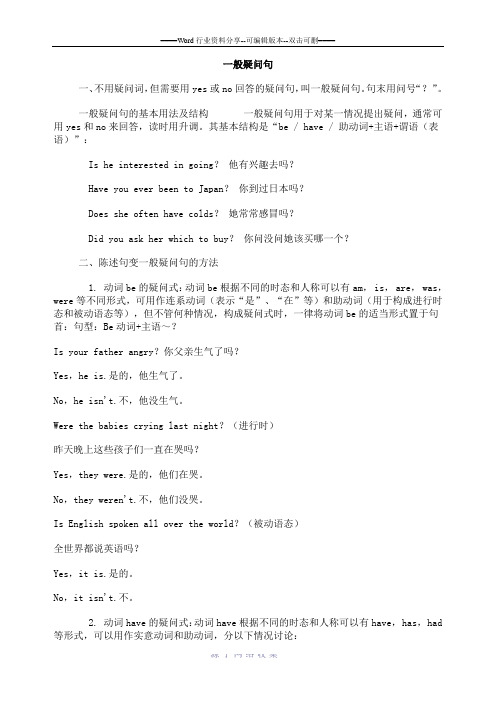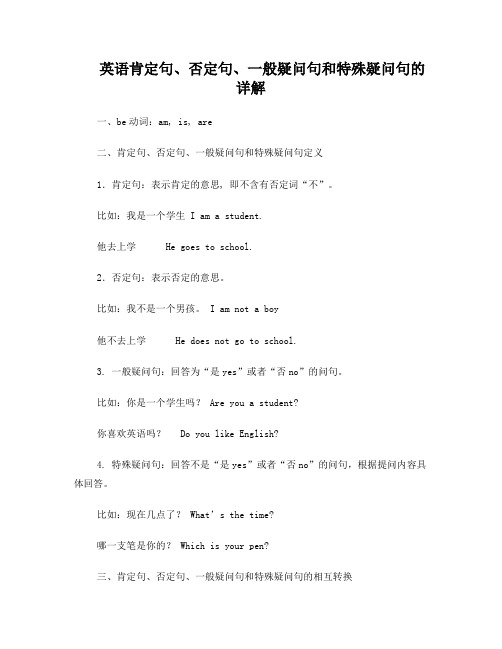小学英语一般疑问句
小学英语一般疑问句和特殊疑问句(附练习题)

小学英语一般疑问句及特殊疑问句专项练习一、一般疑问句1、定义: 用Yes或No作答的疑问句叫一般疑问句。
2、特点:①以be动词、助动词或情态动词开头;例:Is your father a teacher? Does Tom like apples? Can Jenny speak English? ②往往读升调3、陈述句变成一般疑问句的方法:1> 看陈述句中有没有be动词(am、is、are、was、were)或情态动词(can),如果有,将其提到句首,句末打上问号即可。
例:It was rainy yesterday.→Was it rainy yesterday?Tom's father can play the piano.→Can Tom's father play the piano?2>如果句中没有be动词或情态动词,句首加do的相应形式(do、does、did),且原句的谓语动词要变回原形。
1.They go to school by bike. →Do they go to school by bike?2.Bill gets up at 6:30 every day. →Does bill gets up at 6:30 every day?3.The students saw a film yesterday. →Did the students see a film yesterday?注: 1.如果陈述句中有第一人称,则变问句时要变为第二人称。
I usually have lunch at school. →Do you usually have lunch at school?2.如果陈述句中有some, 则变问句时往往要变成any 。
There is some water on the playground. →Is there any water on the playground4、一般疑问句的回答。
小学英语一般疑问句

一般疑问句一、不用疑问词,但需要用yes或no回答的疑问句,叫一般疑问句。
句末用问号“?”。
一般疑问句的基本用法及结构一般疑问句用于对某一情况提出疑问,通常可用yes和no来回答,读时用升调。
其基本结构是“be / have / 助动词+主语+谓语(表语)”:Is he interested in going?他有兴趣去吗?Have you ever been to Japan?你到过日本吗?Does she often have colds?她常常感冒吗?Did you ask her which to buy?你问没问她该买哪一个?二、陈述句变一般疑问句的方法1. 动词be的疑问式:动词be根据不同的时态和人称可以有am, is, are, was,were等不同形式,可用作连系动词(表示“是”、“在”等)和助动词(用于构成进行时态和被动语态等),但不管何种情况,构成疑问式时,一律将动词be的适当形式置于句首:句型:Be动词+主语~?Is your father angry?你父亲生气了吗?Yes,he is.是的,他生气了。
No,he isn't.不,他没生气。
Were the babies crying last night?(进行时)昨天晚上这些孩子们一直在哭吗?Yes,they were.是的,他们在哭。
No,they weren't.不,他们没哭。
Is English spoken all over the world?(被动语态)全世界都说英语吗?Yes,it is.是的。
No,it isn't.不。
2. 动词have的疑问式:动词have根据不同的时态和人称可以有have, has, had 等形式,可以用作实意动词和助动词,分以下情况讨论:①用作实意动词表示状态,如表示拥有、患病或用于have to表示“必须”等,在构成构成式时可以直接将have, has, had置于句首,也可根据情况在句首使用do,does, did:Does he have [Has he] anything to say?他有什么话要说吗?Do you have [Have you] to leave so soon?你必须这么早走吗?Did you have [Had you] any friends then?他当时有朋友吗?②用作实意动词表示动作,如表示“吃(=eat)”、“喝(=drink)”、“拿(=take)”、“收到(=receive)”、“度过(=spend)”等,构成疑问式时不能将have提前至句首,而应在句首使用do, does, did:Does he have breakfast at home?他在家吃早餐吗?Did you have a good time at the party?你在晚会上玩得高兴吗?③完成时的一般疑问句句型:Have(Has)+主语+动词的过去分词+~?Have you known her since your childhood?你从童年就认识她吗?Yes,I have.是的。
21、小学英语一般疑问句和特殊疑问句(附练习题)

一般疑问句一、什么是一般疑问句用Yes或No作答的疑问句叫一般疑问句。
一般疑问句还有下列特点:1、以be动词、助动词或情态动词开头;例:Is your father a teacher? Does Catherine like animals? Can Jenny speak French?2、往往读升调;3、译成汉语,都可以带上“吗”,例如上面三句可分别译为:你父亲是老师吗?凯瑟琳喜欢动物吗?詹妮会说法语吗?二、如何将陈述句变成一般疑问句?要将陈述句变成一般疑问句,可以遵循下列步骤:1.看句中有没有be动词(am、is、 are、 was、 were)、助动词(do、does、did、 have、 had)或情态动词(can、must、will、may等),如果有,将其提到句首,句末打上问号即可。
例:It was rainy yesterday. →Was it rainy yesterday?Tom's father can play the piano. →Can Tom's father play the piano?I have finished my homework. →Have you finished your homework?2.如果句中没有be动词、助动词或情态动词,则根据谓语动词的形式借助do的相应形式放在句首。
具体方法是:如果谓语动词是原形,则借do;如果谓语动词是一般现在时第三人称单数形式,则借does;如果谓语动词是过去式,则借did. 需要注意的是,借does或did后,原句的谓语动词要变回原形。
例:They go to school by bike. →Do they go to school by bike?Bill gets up at 6:30 every day. →Does bill gets up at 6:30 every day?The students saw a film yesterday. →Did the students see a film yesterday?三.陈述句变一般疑问句应注意的事项陈述句变成一般疑问句除了遵循上述规则以外,还应注意下列几点:1.如果陈述句中有第一人称,则变问句时最好要变为第二人称。
小学英语一般疑问句和特殊疑问句(附练习题)

英语肯定句、否定句、一般疑问句和特殊疑问句的详解一、be动词:am, is, are二、肯定句、否定句、一般疑问句和特殊疑问句定义1.肯定句:表示肯定的意思, 即不含有否定词“不”。
比如:我是一个学生 I am a student.他去上学 He goes to school.2.否定句:表示否定的意思。
比如:我不是一个男孩。
I am not a boy他不去上学 He does not go to school.3. 一般疑问句:回答为“是yes”或者“否no”的问句。
比如:你是一个学生吗? Are you a student?你喜欢英语吗? Do you like English?4. 特殊疑问句:回答不是“是yes”或者“否no”的问句,根据提问内容具体回答。
比如:现在几点了?What’s the time?哪一支笔是你的? Which is your pen?三、肯定句、否定句、一般疑问句和特殊疑问句的相互转换有am, is, are的句子,肯定句变否定句:在am, is, are后面加上not,其余按顺序照抄。
肯定句变一般疑问句:把am, is, are提前放到句首并大写Am, Is, Are,其余照抄。
肯定句变特殊疑问句(就划线部分提问):分3步骤第一步:先变一般疑问句第二步:找合适的特殊疑问词代替划线部分第三步:特殊疑问词提前放到句首,并大写,其余按顺序照抄,省略划线部分。
注意:1.一定先变一般疑问句。
但是,如果问的是主语或主语的定语时,语序不变,为"特殊疑问词(+主语)+陈述句"。
如:Li ming 's not here today. Who's not here today? 今天谁没来?2.划线部分不能在特殊疑问句中出现。
when 什么时间(问时间)what date 什么日期问具体日期who 谁(问人)what place什么地点问具体地址whose 谁的问主人how …怎么样问情况where 在哪里问地点how old 多大问年龄which 哪一个问选择how many 多少问数量例如:1.肯定句、否定句和一般疑问句的互换肯定句:This is a book.否定句:This is not a book.一般疑问句:Is this a book?肯定回答:Yes, it is.否定回答:No, it isn’t.2.就划线部分提问(变特殊疑问句)This is a book.第一步:变一般疑问句 Is this a book?第二步:找合适的特殊疑问词 Is this what ?第三步:特殊疑问词提前放到句首,并大写,其余按顺序照抄,省略划线部分。
小学英语一般疑问句和特殊疑问句精讲及练习

一、一般疑问句1、以be动词、助动词或情态动词开头;例:Is your father a teacher? Does Catherine like animals?Can Jenny speak French?2、译成汉语,都可以带上“吗”,例如上面三句可分别译为:你父亲是老师吗?凯瑟琳喜欢动物吗?3、陈述句有没有be动词(am、is、are、was、were)、助动词(do、does、did、have、had)或情态动词(can、must、will、may等),如果有,将其提到句首,句末打上问号即可。
例:It was rainy yesterday. →Was it rainy yesterday?Tom's father can play the piano. →Can Tom's father play the piano?I have got some coffee in the fridge.→Have you got any coffee in the fridge?2.如果句中没有be动词、助动词或情态动词,则加do、does、did.需要注意的是,加does或did后,原句的谓语动词要变回原形。
例:They go to school by bike. →Do they go to school by bike?Bill gets up at 6:30 every day.→Does bill get up at 6:30 every day?The students saw a film yesterday. →Did the students see a film yesterday?二、常用的特殊疑问词有:三、小学阶段,特殊疑问句句型结构有:1、特殊疑问词+助动词+主语+动词原形+其他?Where do you do study English?2、特殊疑问词+be动词+主语+其他?Why is your Mum so angry?3、特殊疑问词+情态动词+主语+动词原形+其他?What can I do for you?四、练习一、在横线上填上适当的疑问代词1、A: is the boy in blue? B:He’s Mike.2、A: pen is it? B:It’s mine.3、A: is the diary? B:It’s under the chair.4、A: balls do you have? B: 13.5、A: are the earphones? B:They are 25 yuan.6、A: is the cup? B:It’s blue.7、A: is it today? B:It’s Sunday.8、A: was it yesterday? B: It was the 13th of October.9、A: this red one? B:It’s beautiful.10、A: is your cousin? B: He’s 15 years old.11、A: do you have dinner? B: At 6 o’clock.二、把下列句子改为一般疑问句。
小学英语知识归纳总结:一般疑问句

小学英语知识归纳总结:一般疑问句1. 概念能用yes / no(或相当于yes / no)回答的问句叫一般疑问句。
2. 含系动词be的一般疑问句的构成具体地说,就是当陈述句中有am /is / are时,可直接将它们提至主语前,但如遇第一人称,最好将其置换成第二人称。
如:I'm in Class 2, Grade 1. →Are you in Class 2, Grade 1? 你是在一年级二班吗?3. 含情态动词的一般疑问句的构成一般疑问句面前人人平等:情态动词与am / is / are一样,也可直接将它们提至主语前,所以问题迎刃而解了。
如:I can spell it. →Can you spell it? 你会拼写它吗?4. 含实义动词的一般疑问句的构成含实义动词的一般疑问句的构成稍微有点讲究,要在句首加do;如逢主语为第三人称单数,谓语动词为一般现在时单数第三人称形式"v-(e)s"时,奉does为座上宾并要变回原形(如has→have,likes→like等);有时陈述句中的some还要变作any等。
如:She lives in Beijing. →Does she live in Beijing? 她住在北京吗?I like English. →Do you like English? 你喜欢英语吗?There are some books on my desk.→Are there any books on your desk?5. 少数口语化的一般疑问句如问一个与前文相同的问句时,可省略成"And you?"或"What / How about...?"等;甚至只抓关键词,读作升调。
如:Your pen? 你的钢笔?6. 小插曲:一般疑问句的语调大部分的一般疑问句都应读作升调(↗),并落在最后一个单词身上。
如:Is it a Chinese car↗?7. 一般疑问句的应答用yes / no(或相当于yes / no的词)回答,并怎么问怎么答(句首为情态动词am / is / are 还是do /does),简略回答时要注意缩写(否定的n't)和采用相应的人称代词以避免重复:即"Yes,主语(代词)+情态动词或am / is / are或do / does."表示肯定;"No,主语(代词)+情态动词或am / is / are或者do / does not(n't)."表示否定。
小学英语一般疑问句练习
小学英语一般疑问句练习一般疑问句是英语中常见的句型之一,它用来询问信息,回答通常为"Yes"或"No"。
对于小学生来说,掌握一般疑问句的结构和用法是学习英语的基础。
以下是一些练习题,可以帮助小学生巩固一般疑问句的知识。
1. Is this your pencil?- Yes, it is. / No, it isn't.2. Do you like oranges?- Yes, I do. / No, I don't.3. Can you swim?- Yes, I can. / No, I can't.4. Is she your sister?- Yes, she is. / No, she isn't.5. Does he have a big dog?- Yes, he does. / No, he doesn't.6. Are they in the classroom?- Yes, they are. / No, they aren't.7. Do you have a basketball?- Yes, I have. / No, I don't.8. Is your mother a teacher?- Yes, she is. / No, she isn't.9. Can you speak English?- Yes, I can. / No, I can't.10. Are they playing football?- Yes, they are. / No, they aren't.11. Do you want to go to the zoo?- Yes, I do. / No, I don't.12. Is it raining?- Yes, it is. / No, it isn't.13. Do you know his name?- Yes, I do. / No, I don't.14. Can you spell your name?- Yes, I can. / No, I can't.15. Is he taller than you?- Yes, he is. / No, he isn't.通过这些练习,学生可以更好地理解一般疑问句的结构,并学会如何正确地回答这些问题。
【免费】小学三年级英语语法:一般疑问句及特殊疑问句
小学三年级英语语法:一般疑问句及特殊疑问句一般疑问句及特殊疑问句句子基本是:简单陈述句,由简单陈述句转变成肯定句,否定句,疑问句。
疑问句是用来提出问题。
英语中有四种疑问句: 一般疑问句、特殊疑问句、选择疑问句和反意疑问句。
我们现在已经接触到了前两种疑问句。
后两种疑问句以后我们还会学到.一、一般疑问句:英语中要用 yes和no 来回答的疑问句叫一般疑问句。
如:(1)Is it hot ? Yes, it is .\No, it isn't. -- be动词引导(2)Is it a car ? Yes, it is .\No, it isn't . -- be动词引导(3)Is this your ruler ? Yes, it is .\No, it isn't . -- be动词引导(4)Do you like bananas ? -- 含实义动词Yes, I like bananas. \ No, I don't like bananas.(5)Can Ming hear a drill ? --含情态动词Yes , Ming can hear a drill.\No,Ming can't hear a drill.陈述句(肯定句,否定句,一般疑问句)的转变规律:1.肯定句: 2.否定句: 3. 一般疑问句及肯否定回答主语+be动词+….主语+be动词+not+….be动词+主语+…?Yes, 主语+be动词./No, 主语+be动词+not.I am a teacher. I am not a teacher. Are you a teacher?--Yes, I am./ No, I am not.My mother is thin. My mother is not /isn'tthin. Is your mother thin?--Yes, she is./ No, she isn't.They are insects. They are not/aren't insects. Are they insects?--Yes. they are./ No, they aren't.主语+情态动词can+…主语+情态动词can+ not+….情态动词can+主语+…?Yes, 主语+情态动词can/No,主语+情态动词can+ notHe can jump. Hecan not/can't jump. Can he jump?--Yes,he can./ No, he can't.主语+动词+….主语+助动词do/does+not助动词do/does+主语+…. 动词原形 +….动词原形?Yes, 主语+助动词do/does.No, 主语+助动词do/does+not.He likes to eat apples. He doesn't like to eat apples. Does he like to eat apples?Yes,he does./ No,he doesn't.We like to eat apples. We don't like to eat apples. Do you like to eat apples?Yes,we do. /No,we don't.二、祈使句:表示请求、命令、建议或劝告等的句子叫祈使句,主语you常省略。
一般疑问句和特殊疑问句 (附练习题及答案
How do you go home?
On foot.
how old
多大
问年龄
How old is he?
6 years old.
how many
多少
问数量
How many books are there in the bookcase?
There are 10.
how much
多少
问价钱
How much is the book?
9. Mrs. Li and Kitty watch television at night.
Do Mrs. Li and Kitty watch television at night? Yes, they do. / No, they don’t.
10. I can finish my homework by myself.
中小学英语一般疑问句和特殊疑问句详解(附练习题及答案)
一、一般疑问句
1、定义:用Yes或No作答的疑问句叫一般疑问句。
2、特点:
1>以be动词am/is/are、助动词do/does、情态动词can/could/may、there be(即there is /are)开头;
例:Is your father a teacher?/ Does Tom like apples? /Can Jenny speak English? /Is there a book on the desk?
There is a book on the desk.→Is there a book on the desk?
2>如果句中没有be动词或情态动词,句首加do的相应形式(do、does、did),且原句的谓语动词要变回原形。
小学英语语法详解疑问句--一般疑问句、特殊疑问句
小学英语语法详解疑问句——一般疑问句什么是疑问句?疑问句是用于提出疑问的句子,可分为:一般疑问句、特殊疑问句、选择疑问句和反意疑问句。
一.一般疑问句以助动词或情态动词开头,语音语调上扬,回答一般为"Yes./No." 的句子。
1.疑问句的主要构成1)Be动词+主语… …?肯定句:He is a student.他是一个学生。
一般疑问句:Is he a student?他是一个学生吗?肯定句:They are drawing pictures. 他们正在画画。
一般疑问句:Are they drawing pictures?他们正在画画吗?Linda老师的小提醒当肯定句为第一人称时,提问用第二人称:肯定句:I am beautiful girl.我是个漂亮的女孩。
一般疑问句:Ave you a beautiful girl?你是个漂亮的女孩吗?2)情态动词+主语… …?肯定句:I can dance.我会跳舞。
一般疑问句:Can you dance?你会跳舞吗?3)助动词+主语肯定句:I like college life.我喜欢大学生活。
一般疑问句:Do you like college life?你喜欢大学生活吗?肯定句:They saw some trees here last year.他们去年在这里看到一些树。
一般疑问句:Did they see any trees here last year?他们去年在这里看到一些树了吗?肯定句:I have finished my work.我已经完成了我的工作。
一般疑问句:Have you finished your work?你已经完成了你的工作了吗?Linda 老师的小提醒★将肯定句改为一般疑问句和改成否定句的窍门是一样的,一般有以下两种情况。
a.如果句子里有be动词,情态动词以及have作为助动词的时候,直接将它拉到句首,结尾变成问号即可:He is twelve.→ Is he twelve?She can swim.→ Can she swim?I have got it.→ Have you got it?b.当句子里是实义动词时,我们也可以用一些小窍门:肯定句:I go to the park.我去公园。
- 1、下载文档前请自行甄别文档内容的完整性,平台不提供额外的编辑、内容补充、找答案等附加服务。
- 2、"仅部分预览"的文档,不可在线预览部分如存在完整性等问题,可反馈申请退款(可完整预览的文档不适用该条件!)。
- 3、如文档侵犯您的权益,请联系客服反馈,我们会尽快为您处理(人工客服工作时间:9:00-18:30)。
新人教版小学英语一般疑问句
永胜县程海镇海腰村校:李红涛
一般疑问句归纳:
1.Is she your mother?
她是你妈妈吗?
Yes,she is.
是的,她是。
2.Is he your father?
他是你爸爸吗?
No,he isn’t.
不,他不是
3.Is it in your bag?
它在你包里吗?
No,it isn’t.∕Yes,it is.
不,它不在。
∕是的,在。
4.Do you like orange?
你喜欢橙子吗?
No,I don’t.∕Yes,I do.
不,我不喜欢。
∕是的,我喜欢。
5.Is she in the living room?
她在客厅吗?
No, she isn’t.
不,她不在。
6.Are they on the table?
它们在桌子上吗?
No, they aren’t. They’re in the door.
不,不在。
它们在门上。
7.Is this your uncle?
这是你叔叔吗?
Yes, it is. He’s a football player.
是的,他是个足球运动员。
8.Is this the teachers’ office?
这是教师办公室吗?
No, it isn’t. The teachers’ office is next to the library.
不,不是。
教师办公室挨着图书馆。
9.Is that the computer room?
那是计算机房吗?
10. Do you have a library?
你们有图书馆吗?
Yes, we do.
是的,有。
11.Can I go outside now?
现在我能出去吗?
Yes,you can.∕No,you can’t.
是的,可以。
不,不能。
It’s cold outside.
外面冷。
12.Is it cold?
天冷吗?
No, it isn’t.
不,不冷。
13.Are these carrots?
这些是胡萝卜吗?
Yes,they are.
14.Are they hens?
它们是母鸡吗?
No,they aren’t. They’re ducks.
不,不是。
它们是鸭子。
15.Are these yours?
这(双鞋)是你的吗?
No,they are’t.
不,不是。
They’re Chen Jie’s.
它们是陈洁的。
16.Is this John’s?
这是约翰的吗?
No,it isn’t. It’s Mike’s.
不是。
它是迈克的。
17.Is he young?
他年轻吗?
No,he isn’t.
不,他不年轻。
18.Do you often read books in this park?
你经常在这个公园里看书吗?
No,I don’t.
不,我不在这儿看。
19.Can you do any kung fu,John?
约翰,你会武术吗?
Yes, I can.
是的,我会。
20.Is there a river in the forest,Miss White?
怀特小姐,森林里有河吗?
No, there isn’t.
不,没有河。
21.Are there any tall buildings in the nature
park?
自然公园里有高楼吗?
No, there aren’t.
不,没有高楼。
22.Is he drinking water?
它在喝水吗?
No, he isn’t. He’s eating.
不是,他在吃东西。
23.Does he live in Sydney?
他住在悉尼吗?
No,he doesn’s.
不,他没有。
24.Does he like doing word puzzles and
going haking.
他喜欢猜字谜和远足吗?
Yes,he does.
是的,他喜欢。
